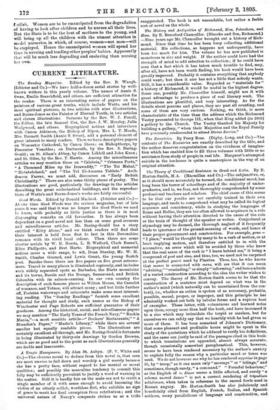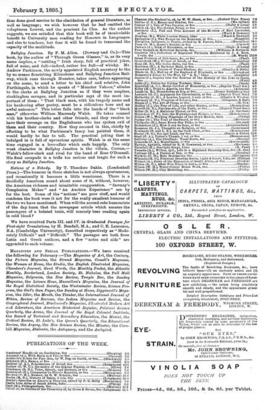The Theory of Conditional Sentences in Greek and Latin. By
R. Horton-Smith, M. A. (Macmillan and Co.)—The subjunctive, or, as it should more accurately be termed, the conditional mood, has long been the terror of schoolboys and of the majority of under- graduates, and is, we fear, not thoroughly comprehended by some professional teachers and scholars. The chief cause of this seems to be that our youths are not carefully trained in their own language, and made to comprehend what may be called its logical sequence and consistency, while in studying the languages of Rome and Hellae, they are too often allowed to acquiesce in a rule without having their attention directed to the cause of the rule or the train of thought of the speaker or writer. Conjectural as etymology may be deemed, the thorough neglect of it frequently leads to ignorance of the ground-meaning of words, and hence of their proper government and construction. For example, pone --- " I place," would be thought by many to be a verb of motion, or at least implying motion, and therefore entitled to in with the. accusative, an error which will be avoided by those who know that the real sense of the verb is " I leave behind me," it being a compound of post and sine, and thus, too, we need not be surprised at the perfect posivi used by Plautus. Thus, too, he who knows that moneo is connected with mans, will see that it can mean. "advising," " reminding," or simply " informing," and hence admits of a varied construction according to the idea the writer wishes to convey. The theory of Mr. Horton•Smith seems to be that the construction of a sentence must depend on what was in the author's mind (which naturally can be ascertained from the con- text), i.e., whether an action is spoken of as necessary, probable, possible, casual, proper, or improper, and this principle he has admirably worked out both by tabular forms and a copious host of examples. These latter, with voluminous and learned notes upon them, occupy more than half the book, and have increased it to a size which may intimidate the torpid or careless, but for ourselves we can safely say that we heartily wish he had given us more of them. It has been remarked of Johnson's Dictionary, that some pleasant and profitable hours might be spent in the study of the quotations which he adduced to verify his definitions, and the same can justly be said of the passages cited in this book, to which translations are appended, almost always accurate, though occasionally somewhat paraphrastical. This, however, seems to have been rendered necessary by the author's anxiety to explain fully the reason why a particular mood or tense was used. We do not however see why he has rendered anEXicul in page 35, by " troop," as it can mean only " message " or " tidings," and sometimes, though rarely, " a command." " Forceful behaviour," as the English of Tt Ofatov seems a little affected, and surely " a solemn sacred dance " is not a correct rendering of tripudium saistimum, when taken in reference to the sacred fowls used in Roman augury. Mr. Horton-Smith has also judiciously and beneficially cited from English, French, Italian, and Spanish authors, many parallelisms of language and construction, and
thus done good service to the elucidation of general literature, as well as language ; we wish however that he had omitted the voluptuous Louvet, and the prurient La Clog. As the author suggests, we are satisfied that this book will be of incalculable benefit to University men reading for Honours in Languages, and also to teachers, but fear it will be found to transcend the capacity of the multitude.



































 Previous page
Previous page